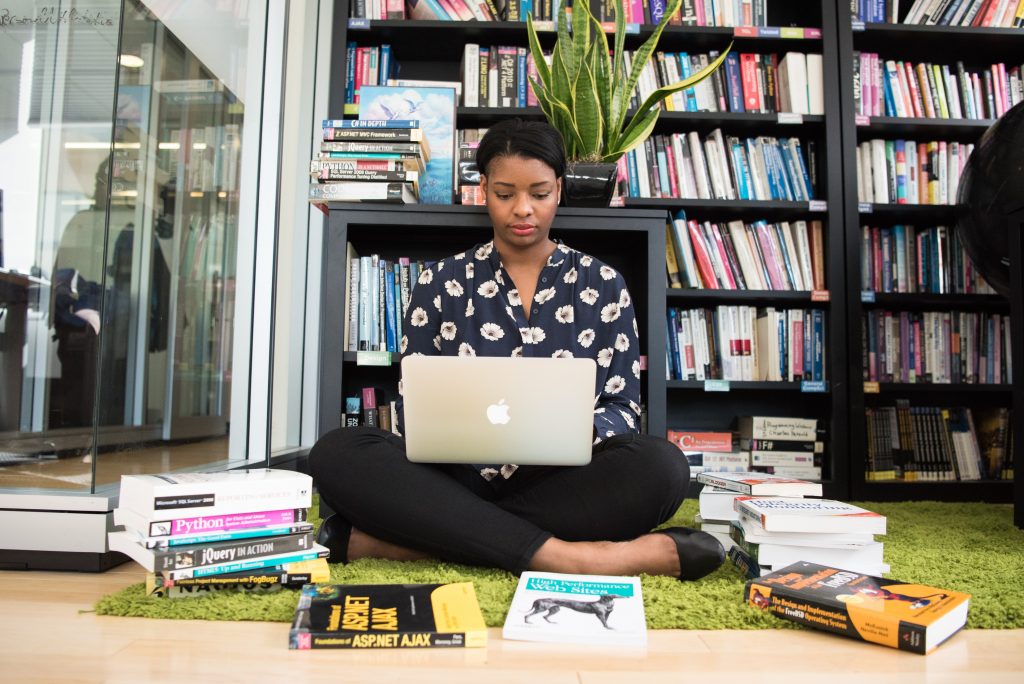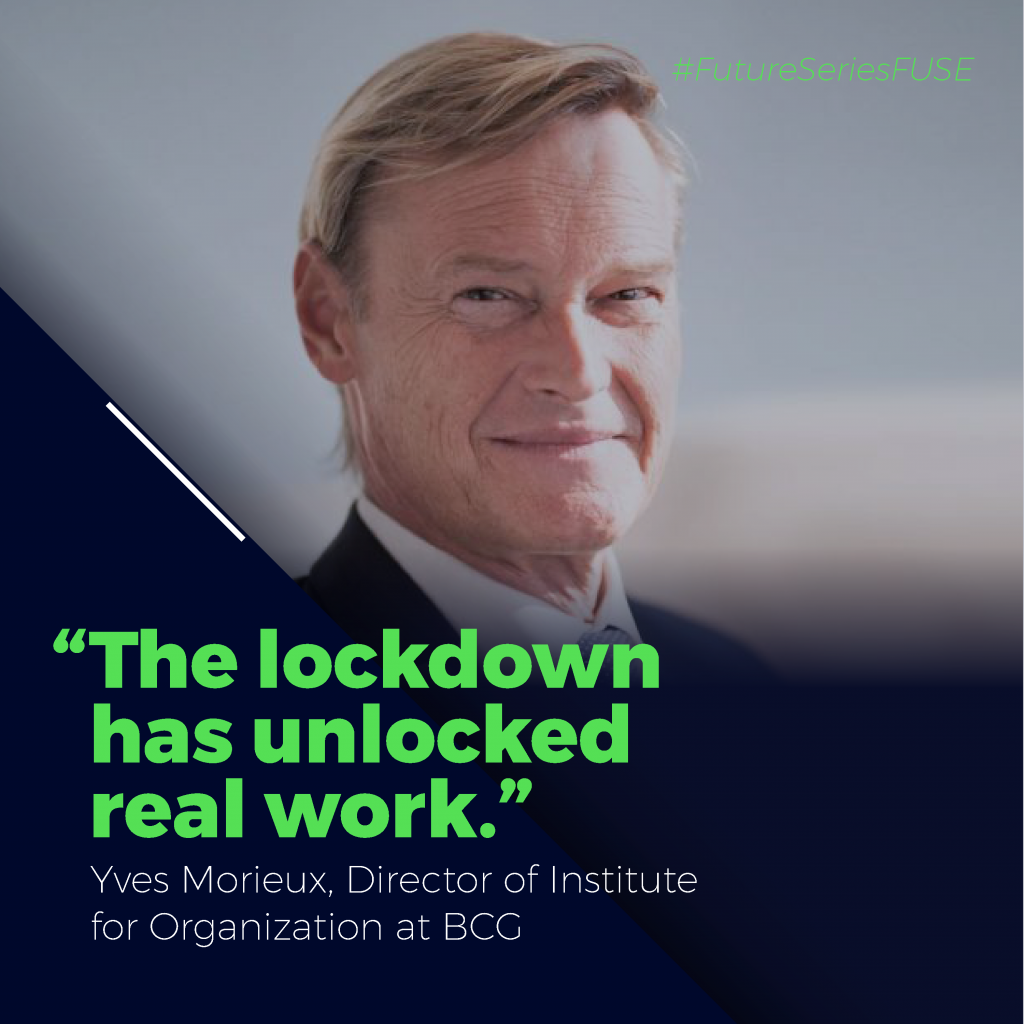COVID-19 has changed the world of work in unprecedented ways. The rapid and devastating spread of the coronavirus brought global business activity to a screeching halt. Businesses and employees alike were faced with a scenario most had never imagined.
September 22, 2020

Convening at this absolutely critical moment, FU.SE Digital 2020 brought together some of the world’s top thinkers in business, human resources and artificial intelligence to generate effective solutions to ensure the world of work comes out of the pandemic stronger than before.
Digitalisation in the workplace has been ongoing for years, but the pandemic massively accelerated the progress. For workers lucky enough to be able to shift their job completely remote, home-working was a sudden new reality. Unfortunately, many jobs were completely stopped or slowed.
Yves Morieux, Director of Institute for Organization at BCG put it elegantly: "The lockdown has unlocked real work".
A Changing World of Work
Digitalisation in the workplace has been ongoing for years, but the pandemic massively accelerated the progress. For workers lucky enough to be able to shift their job completely remote, home-working was a sudden new reality. Unfortunately, many jobs were completely stopped or slowed.
Yves Morieux, Director of Institute for Organization at BCG put it elegantly: "The lockdown has unlocked real work".

Essential jobs – healthcare, food services and logistics, for example – not only continued, but their importance and utility were amplified. A spotlight has been shone on these often underappreciated workers. Indeed, the lockdown has exposed the real, essential work.
🔹 The pandemic has highlighted inequalities in the labour market: COVID-19 accelerates the divide between institutions that have access to technology and those that do not.
🔹 Essential workers keep the economy running: These positions are often lower paid and underappreciated. They’re also exposed directly to the dangers of the virus.
🔹 COVID-19 had a devastating impact on the young workforce: Job and education losses hit young people hard, creating uncertainty for their futures.
🔹 Mental health for remote workers a real issue: Many people struggling with adapting to home working face feelings of isolation and depression.
At FU.SE 2020, participants brought forward actionable solutions to overcome these challenges to ensure a future of work stronger than before this devastating crisis.
Leadership had to adapt to the sudden wave of remote work. Janina Kugel, Non-Executive Board Member at Konecranes and Senior Advisor for BCG suggested that some companies were prepared, others were not. Those who were prepared, with digital working systems in place, “knew what to do. Others had to learn it the tough way, and others are still struggling with that”.
No matter if a business was well-prepared for this unprecedented shift toward remote work, all workers and employers were forced to adapt quickly and adjust to a new normal.
Moving forward, business leaders must be agile in their leadership style for a future of work that is likely a hybrid remote and in-office duality.
Accelerated adoption of digital work also raises questions about the future of work from a human perspective. Janina Kugel contemplated whether humans were ready to change our behaviours. If not for the lockdowns, do workers actually want to work from home?
“Digitisation is not working from home – working from home has already been possible for the last 10 years”.
It’s been entirely possible, but workers still went to the office. COVID-19 forced office workers out of the social setting and into their homes. Humans, as social beings, must learn to adjust to a new way of work and business leaders need to facilitate a smooth transition.
With a hybrid model of work being the new normal, at least in the short term, a focus on Emotional Intelligence (EI) and empathy – not just for leaders but employees alike – will be key in securing a healthy and prosperous future for workers and for employers.
The pandemic has posed many challenges but it’s also an opportunity to finally put in motion many positive changes. Accelerated adoption of even more digitalisation, more robust remote working options and a widespread acceptance of virtual social interaction will help the labour market prosper moving forward.
“In every crisis we make discoveries that change society” said Yves Morieux. He believes the sudden adoption of remote work has caused many positive improvements in the way in which we communicate:
The world of work needs to continuously change and adapt to the many disruptive trends it faces. Protecting the status quo will not induce progress, especially in times of adversity.
🔹 The pandemic has highlighted inequalities in the labour market: COVID-19 accelerates the divide between institutions that have access to technology and those that do not.
🔹 Essential workers keep the economy running: These positions are often lower paid and underappreciated. They’re also exposed directly to the dangers of the virus.
🔹 COVID-19 had a devastating impact on the young workforce: Job and education losses hit young people hard, creating uncertainty for their futures.
🔹 Mental health for remote workers a real issue: Many people struggling with adapting to home working face feelings of isolation and depression.
At FU.SE 2020, participants brought forward actionable solutions to overcome these challenges to ensure a future of work stronger than before this devastating crisis.
#1. Agile Leadership
Leadership had to adapt to the sudden wave of remote work. Janina Kugel, Non-Executive Board Member at Konecranes and Senior Advisor for BCG suggested that some companies were prepared, others were not. Those who were prepared, with digital working systems in place, “knew what to do. Others had to learn it the tough way, and others are still struggling with that”.
No matter if a business was well-prepared for this unprecedented shift toward remote work, all workers and employers were forced to adapt quickly and adjust to a new normal.
Moving forward, business leaders must be agile in their leadership style for a future of work that is likely a hybrid remote and in-office duality.
-
A focus on empathy will be required to help workers struggling with the feelings of isolation. Mental health initiatives will need to be further integrated into corporate policy.
-
Managers must trust and give increased responsibility to their employees. Micromanagers will be left behind in favour of leaders who give clear instruction and engage in open, two-way communication.
-
Young people starting their careers will need to be supported and kept engaged. At the most critical development step in their career, they cannot be left behind.
#2. Emotionally Intelligent Digital Revolution
Accelerated adoption of digital work also raises questions about the future of work from a human perspective. Janina Kugel contemplated whether humans were ready to change our behaviours. If not for the lockdowns, do workers actually want to work from home?
“Digitisation is not working from home – working from home has already been possible for the last 10 years”.
It’s been entirely possible, but workers still went to the office. COVID-19 forced office workers out of the social setting and into their homes. Humans, as social beings, must learn to adjust to a new way of work and business leaders need to facilitate a smooth transition.
With a hybrid model of work being the new normal, at least in the short term, a focus on Emotional Intelligence (EI) and empathy – not just for leaders but employees alike – will be key in securing a healthy and prosperous future for workers and for employers.
#3. Carry Forward Progress
The pandemic has posed many challenges but it’s also an opportunity to finally put in motion many positive changes. Accelerated adoption of even more digitalisation, more robust remote working options and a widespread acceptance of virtual social interaction will help the labour market prosper moving forward.
“In every crisis we make discoveries that change society” said Yves Morieux. He believes the sudden adoption of remote work has caused many positive improvements in the way in which we communicate:
-
We focus on being clear
-
We stop sending weak signals
-
We create trust and inclusivity through right to speech and equal air time for all employees
The world of work needs to continuously change and adapt to the many disruptive trends it faces. Protecting the status quo will not induce progress, especially in times of adversity.
Martine Ferland, CEO of Mercer, stressed that “we cannot waste the learning we gained”.



